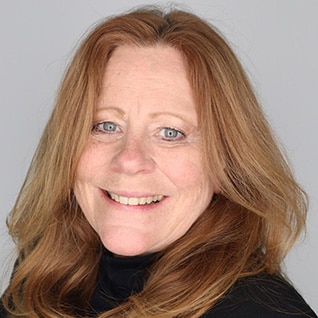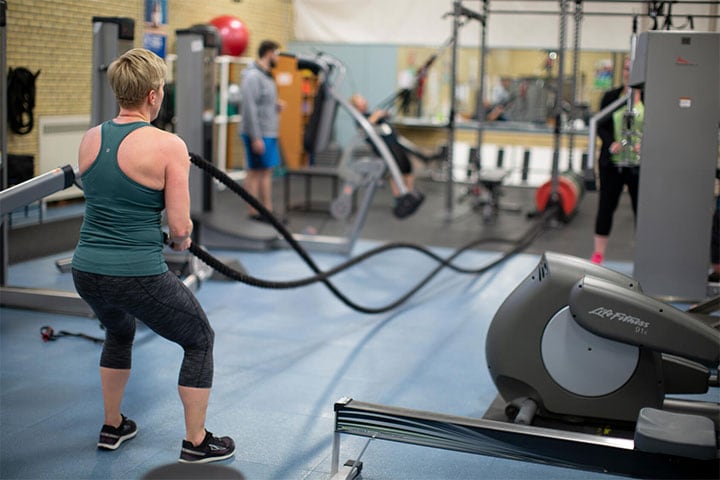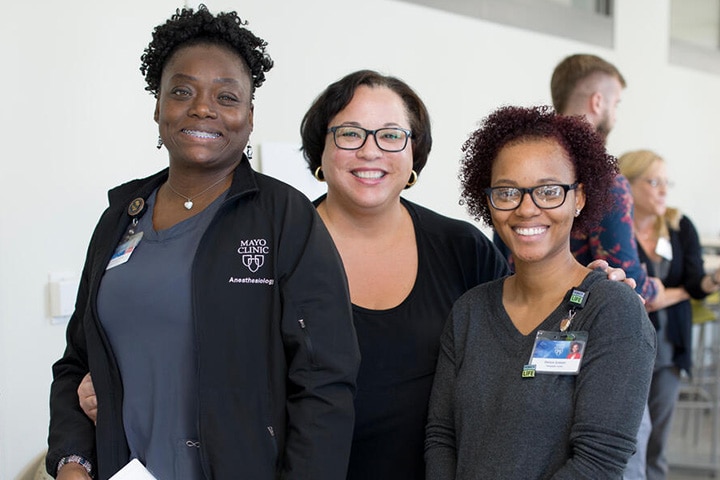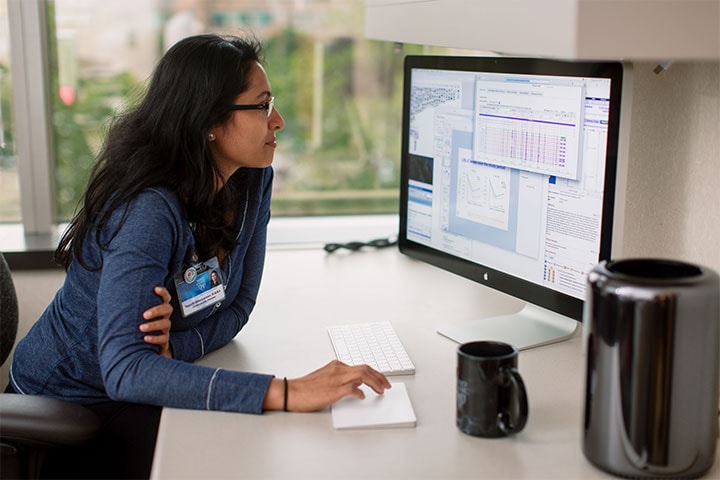Overview
The Clinical Neuropsychology Fellowship at Mayo Clinic’s campus in Arizona is committed to providing comprehensive advanced training for clinical neuropsychologists. The program offers one two-year full-time postdoctoral position for doctoral-level neuropsychologists. The comprehensive training in adult neuropsychology prepares the learner for board certification through the American Board of Clinical Neuropsychology (ABCN).
The two major rotations are: Outpatient Adult Neuropsychological Assessment and a unique Neurosurgical Populations rotation that includes brain mapping methods. Additional minor rotations include the Mayo Health Action to Benefit Independence & Thinking (HABIT®) program, Executive Medicine Brain Health, and Concussion. Approximately 10% research time is afforded for fellows to engage in a wide range of research areas.
The breadth of experience during the fellowship will provide trainees for careers within a multidisciplinary medical, academic, or community setting. Mayo Clinic in Arizona harbors a supportive environment that values patient care, education and research in a collegial and collaborative setting that offers trainees the opportunity to enhance their clinical expertise, confidence and leadership.
faculty to trainee ratio
hospital in Arizona for 13 consecutive years (U.S. News, 2025-2026)
days of sunshine each year
Certification, program history
Certification
The Clinical Neuropsychology Fellowship at Mayo Clinic in Arizona is a member of the Association of Postdoctoral Programs in Clinical Neuropsychology (APPCN). The APPCN does not accredit postdoctoral programs, but has developed training standards and a code of conduct for affiliated programs to which this program complies.
Program history
This is a newly established fellowship that will provide comprehensive training in neuropsychology that will meet all requirements for board certification through the American Board of Clinical Neuropsychology (ABCN). This program is aligned with the established neuropsychology fellowships at Mayo Clinic in Florida and Minnesota, and the prospective fellow will benefit from training experiences shared with these programs, in addition to some unique opportunities.
This fellowship in Mayo Clinic in Arizona was established to train a new generation of clinical neuropsychologists who can take advantage of utilizing brain mapping combined with traditional neuropsychological assessments to provide state-of-the-art care to clinical populations. This Clinical Neuropsychology Fellowship at Mayo Clinic in Arizona is enthusiastically supported by Mayo Clinic in Arizona’s multidisciplinary team providing neurological care.
Application process
Positions
One position is available on a competitive basis every two years in the Clinical Neuropsychology Fellowship at Mayo Clinic’s Arizona campus. The position will start on or about July 1, 2025.
This is a unique opportunity for a neuropsychology fellow to gain in-depth expertise in clinical brain mapping in addition to comprehensive training in adult outpatient neuropsychological evaluations allowing them to be well-placed to provide state-of-the-art neuropsychological services in multidisciplinary settings. The competitive applicant will be excited to gain hands-on expertise in brain mapping procedures (functional MRI/tractography mapping, intraoperative mapping, Wadas) and epilepsy assessments.
The program provides the fellow with a broad exposure to adult neurological populations that deepen their skills in providing high level neuropsychological care. In all major and minor rotations, the fellow strengthens their skills in communicating with other medical disciplines. The breadth of research interests of the neuropsychology faculty and their collaborators allow the fellow exciting avenues to develop their research skills and interests.
Qualifications
Applicants for the Clinical Neuropsychology Fellowship must have completed a doctoral degree from a program accredited by the American Psychological Association (APA) or Canadian Psychological Association (CPA) in one of the health service delivery areas of psychology, such as clinical psychology or counseling psychology.
Graduate training must include core course work in:
- Clinical psychology, including psychometric theory, assessment, and psychopathology
- Foundations in brain behavior relationships, including functional neuroanatomy and neurological disorders
- The practice of neuropsychology, including specialized assessment and intervention techniques
Graduate training in research design and methodology, statistics, and professional ethics also is required.
All applicants must complete an APA- or CPA-accredited internship with rotation in a neuropsychology specialty area. All doctoral degree requirements, including successful dissertation defense, must be completed before the Clinical Neuropsychology Fellowship begins.
Submit a letter from the director of training certifying that all commitment requirements will be completed by July 1, 2025. If not conferred before July 1, 2025, please have the director certify what date the degree will be conferred.
Also see general admissions requirements.
How to apply
The academic year begins July 1, 2025, though flexibility in the start date often can be arranged.
The application and all supporting documentation must be submitted by Dec. 1, 2024.
You must apply through the Association of Psychology Postdoctoral and Internship Center Psychology Postdoctoral Application centralized application service (APPA CAS), a third-party application service.
- Visit the APPA CAS application website. All applications to Mayo Clinic School of Graduate Medical Education programs must include these application materials.
This fellowship requires that you submit the following additional application materials either through the APPA CAS website or by direct U.S. mail to the fellowship director:
- One sample clinical report (edited for confidentiality)
- One paragraph about a challenge you had to overcome, and how you succeeded
- Reprints or pre-prints of published manuscripts (optional)
Leslie Baxter, Ph.D., ABPP-CN
Clinical Neuropsychology Fellowship Director
Department of Psychiatry and Psychology
13400 E. Shea Blvd.,
Scottsdale, AZ 85259
- This fellowship is a member of the Association of Postdoctoral Programs in Clinical Neuropsychology (APPCN) Resident Matching Program. To register, contact the APPCN Resident Matching Program. Please contact Program Director Dr. Leslie Baxter for further information. All recruitment and notification procedures comply with the rules set forth by the APPCN and follow American Psychological Association ethical guidelines. Applicants are free to choose among fellowship offers without prejudice.
- Selected applicants will be notified in December 2024, of an invitation to interview. Select candidates may be offered onsite interviews Jan. 8, 9 and possibly Jan. 15. Zoom or Teams video interview options are also available.
Curriculum
Clinical training
This two-year Clinical Neuropsychology Fellowship training program consists of about 90% clinical and didactics and 10% research time, with possibly more time devoted to research depending on the needs of the project.
Clinical services include an adult outpatient neuropsychological assessment that will be at Mayo Clinic in Scottsdale, Arizona, outpatient campus. The other major rotation in Neurosurgical Populations/Brain Mapping Methods is at the Phoenix Hospital campus and includes both neuropsychological assessment of in-patient epilepsy patients and surgical mapping methods including functional MRI/DTI mapping, Wada evaluations and intraoperative surgical mapping. The two major rotations are designed as six-month blocks in the first and second year to allow for increased independence over time.
Didactics include general conferences with experiences to prepare for ABPP-CN board certification including a Mayo Multi-site Neuropsychology conference across Arizona, Florida, and Minnesota campuses in addition to neuropathology and neuroanatomy didactics and multi-specialty conferences in brain tumors, epilepsy among others.
The breadth of patients cared for is extensive at this destination medical center. Outpatient evaluations include patients within Mayo who are referred for neurodegenerative disease, movement disorders, pre-transplant evaluations, traumatic brain injury, neuroimmune disorders, and other conditions. We have a close collaboration with the Epilepsy treatment team and both outpatient and inpatient neuropsychological assessments, Wada evaluations, and presurgical MRI mapping of epilepsy patients allow for a satisfying continuity of training experiences. Presurgical and intraoperative brain mapping patients also includes patients with brain tumors, cerebrovascular abnormalities and other conditions.
All five of the Clinical Neuropsychology faculty are board certified and will supervise you directly on clinical cases, discussing formulation and recommendations for each case. You will have one-on-one brain mapping training from the director of the training program who has 25 years of brain mapping experience.

Rotation schedule, rotation descriptions
Rotation schedule
| Rotation | Length |
|---|---|
| Major Rotation: Outpatient Adult Neuropsychological Assessment |
Program Year 1: 6-month rotation Program Year 2: 6-month rotation |
| Major Rotation: Neurosurgical Populations (Brain Mapping in Epilepsy, Neuro-oncology, Cerebrovascular) |
Program Year 1: 6-month rotation Program Year 2: 6-month rotation |
Rotation descriptions
Outpatient Adult Neuropsychological Assessment: Required major rotation emphasizing skill development in differential diagnosis, longitudinal assessment, delivering feedback, and communicating treatment considerations to referral sources.
Neurosurgical Populations (Brain Mapping in Epilepsy, Neuro-oncology, Cerebrovascular): Required major rotation that develops the neuropsychologist as part of multi-disciplinary neurosurgical teams by training brain mapping methods including inpatient epilepsy evaluations, functional MRI and DTI, Wada, and intraoperative mapping.
Electives
Healthy Action to Benefit Independence and Thinking (HABIT®): Elective minor rotation. HABIT is designed to support cognitive, behavioral, and emotional features of MCI and early dementia. You will become aware of support groups and patient advocacy organizations that support the patient and his/her family with neurodegenerative disease.
Concussion: Elective minor rotation within an interdisciplinary concussion/return to play clinic that helps individuals return to work and athletes return to school and play safely after a concussion.
Executive Medicine Brain Health: Elective minor rotation. This program focuses on preventive health and wellness using comprehensive, holistic preventive health evaluation processes integrated with a multi-disciplinary team and with health therapeutics to help practicing executives (typically of fortune 500 companies) improve their vital longevity and meet their health goals. This assessment is typically conducted remotely using computerized cognitive platforms.
Rotations to other Mayo Clinic sites. Elective one month training with the neuropsychology faculty in Florida or Minnesota to gain learning experiences unique to those settings. This rotation is typically arranged during the second year of the fellowship.
Elective rotations can vary in time depending on the experience but will typically be about 20% of the clinical training time. Other opportunities to shadow in other disciplines such as behavioral neurology, epilepsy, neuroradiology, and other disciplines are available.
Didactic training
During the Outpatient Adult Neuropsychological Assessment rotation, you will see about five cases per week with supervision with the attending neuropsychologist. You will test some evaluations with psychometrist support for additional cases the first year of the rotation with more psychometrist support the second year.
The number of patients Neurosurgical/Brain Mapping rotation will vary due to the nature of the service. You will assist with assessments with gradual increase in independence with proficiency of the mapping procedures. There is a biweekly Mayo Clinic Multi-Site Neuropsychology Conference didactic, a neuroanatomy course, and other scheduled didactics throughout the week. There are other optional didactics and at least 10% weekly research time scheduled.
Didactic experiences include:
- Mayo Multi-Site Neuropsychology Video Conference
- Multidisciplinary Epilepsy Case Conference
- Neuro-Oncology (Cranial, Spine and Peripheral Nerve) Conference
- Neuropsychological Surgical Mapping Conference
- Neuroanatomy Course
- Gross Neuropathology (Braincutting)
- Arizona Alzheimer’s Disease Research Center Consensus Conference
- Neuroscience course and Grand Rounds
- Behavioral Neurology Course
Core didactics are embedded in the clinical practice with attention to didactic schedule taken into account when scheduling patient care.
Conferences, research opportunities
Conferences
In addition to didactics listed above, other conferences in neurosurgery, psychiatry, neurology, and neuroradiology are available.
Research opportunities
As part of the Scientist-Practitioner model, fellows have dedicated time for research. This dedicated time is at least 10% and may be more depending on the clinical rotation and research project. Most neuropsychologists have thriving research programs with extant cognitive and imaging data. Faculty have joint appointments and research collaborations with Arizona State University, allowing for research with university professor collaborations in areas such as autism, brain tumors, and aging.
Neuropsychology enjoys strong collaborative relationships with other disciplines, allowing you to combine cognitive, imaging (including 7 Tesla imaging), and other data for exciting research examining brain-behavior relationships.
Moonlighting
The Clinical Neuropsychology Fellowship discourages but does not prohibit moonlighting. Requests for moonlighting will be reviewed on an individual basis, and all moonlighting must be approved by the program director in advance. Moonlighting parameters will be determined on an individual basis.
Teaching opportunities, evaluation, mentorship
Teaching opportunities
You will have the opportunity to present at the multi-site neuropsychology conference and other conferences. There may be opportunities to give select lectures at Arizona State University. Effectively communicating complex information to a wide range of audiences is an important skill for neuropsychologists working in academic and medical settings.
Evaluation
Evaluation of your progress includes ongoing information observed during clinical, didactic, and research activities via faculty and director supervision. Formal evaluation of core competencies will be provided by the clinical supervisors on a quarterly basis.
Mentorship
You will benefit from close mentorship from experienced, ABPP-CN board certified neuropsychologists. We have a passion for providing high quality patient care. As members of hospital and national organizations, faculty can provide mentorship in leadership. You can seek mentorship from the areas of research interest of our faculty members, who have existing data that can foster successful research plans. In addition to our faculty’s grant experience, you will have opportunities for workshops and other didactics related to academic development.
Facilities and locations
Mayo Clinic's two Arizona campuses are the hospital which is located in northeast Phoenix and the outpatient clinic located in Scottsdale. The distance between campuses is a 20-minute drive.
You will spend six months at each campus for both years. Faculty members have offices at both campuses, with some faculty occasionally rotating between the two campuses.
Both campuses have outpatient practices with the majority of outpatients seen at the Scottsdale clinic. Neuroimaging, epilepsy monitoring unit, and surgical procedures are at the hospital campus, along with some outpatient offices. The Phoenix campus has recently expanded and has state-of-the-art neuroscience facilities including 7 Tesla MRI, simulation center and other advanced teaching, and patient care facilities.
Belonging
At Mayo Clinic, we foster an inclusive working environment and embrace the diversity of all our trainees, faculty, staff, and patients. Our Office of Belonging offers tremendous resources to support our mission of maintaining a welcoming atmosphere for all our employees, including our learners. We strive to provide culturally appropriate care and do our part to reduce healthcare disparities.
/0x0:512x512/prod01/channel_2/media/studio-sites/mccms-reference-guide/512X5121573348_3801872_0024-(1).jpg)
Video: See yourself at Mayo Clinic
5:33
From the program director
 Thank you for your interest in the Clinical Neuropsychology Fellowship at Mayo Clinic’s campus in Phoenix/Scottsdale Arizona. As the clinical director, I am dedicated to providing the best possible learning experience for you.
Thank you for your interest in the Clinical Neuropsychology Fellowship at Mayo Clinic’s campus in Phoenix/Scottsdale Arizona. As the clinical director, I am dedicated to providing the best possible learning experience for you.
We were granted this new adult neuropsychology fellowship position because of our unique opportunity to provide advanced and exciting training experiences that partner well with the traditional adult outpatient services, preparing you for a satisfying career in clinical neuropsychology. Our service provides a broad training experience that will solidify your knowledge of brain-behavior relationships and how neuropsychology integrates with other medical professions.
As your program director, I will be working with you closely to provide the resources you need to make the fellowship individualized and relevant to your career. Along with the important anchor of classical diagnostic assessment and treatment planning, you will have a unique opportunity to learn brain mapping skills that are becoming increasingly relevant in neuropsychology.
Beyond the core outpatient neuropsychology and brain mapping rotations, we provide complementary minor rotations highlighting interventions relevant to patients with mild cognitive impairment (the Health Action to Benefit Independence & Thinking HABIT) and traumatic brain injury (Cognitive Rehabilitation). We also have a unique experience providing screening, feedback, and recommendations for executives through our Executive Brain Health program.
I am excited to form a collaborative relationship with you to foster your emerging role as a leader in clinical neuropsychology.
Leslie Baxter, Ph.D.
Clinical Neuropsychology Fellowship Program Director
Department and faculty
Mayo Clinic in Arizona has a vibrant and busy clinical neuropsychology section providing the highest level of clinical care. The focus of department is to provide comprehensive and informed diagnostic and treatment evaluations for patients referred for cognitive questions related to primarily neurological or medical illnesses. All neuropsychological faculty are board certified and have experience mentoring post-doctoral clinical neuropsychologists. The program is designed to provide training consistent with the Houston Conference Guidelines.
The neuropsychology service provides excellent training aimed to prepare you for a successful independent career in adult neuropsychology. This fellowship is particularly well-suited to those who are interested in pursuing a career within a multidisciplinary setting which increasingly includes advanced brain mapping methods.
The supportive environment will help you progressively develop their clinical skills and independence over the two-year program with at least two hours of faculty supervision per week along with didactics supporting brain-behavior relationship knowledge and board preparation didactics in fact finding, ethics and other relevant topics. Mayo Clinic in Arizona has a strong commitment to neuroscience-related patient care and the friendly and collaborative interdisciplinary environment will provide an excellent training fellowship experience.
Meet the faculty
 |
Leslie Baxter, Ph.D.Program DirectorDr. Baxter is board certified by the American Board of Professional Psychology in clinical neuropsychology and a Professor of Psychology. She has over 25 years’ experience in traditional adult neuropsychology as well as performing clinical functional MRI, tractography, WADA, and intraoperative mapping procedures.
Dr. Baxter has a passion for training and has mentored trainees at many levels of training. She has served as a mentor for neuropsychology fellows as well as undergraduate and graduate students. Her research interests include brain imaging, brain tumors, aging and Alzheimer’s disease, Autism Spectrum Disorder. Dr. Baxter holds joint appointments in Neurosurgery and Radiology and is adjunct faculty in Arizona State University’s Departments of Psychology, Speech and Hearing Science, and School of Biological and Health Systems Engineering. |
 |
Dixie Woolston, Ph.D.Associate Program Director Dr. Woolston is the program co-director and Chair of the Psychology division. She heads the Executive Brain Health program, and has experience in program development. Dr. Woolston is board certified by the American Board of Professional Psychology in clinical neuropsychology and an Assistant Professor of Psychology. She is the co-director of the fellowship program and is Division Chair of Neuropsychology.
Dr. Woolston has experience providing training in university, VA, and private practice settings. She was a member of the National Academy of Neuropsychology’s Culture and Diversity committee (2014-17), and is a member of the Mayo COVID Safety Liaison, Arizona Associate Chairs of Practice Committee, Arizona Associate Chairs of Practice Committee, and Mayo Clinic Employee Well-Being Team HELP Program Trained Peer Supporter. She performs both English and Spanish neuropsychological evaluations and brain mapping procedures. She has developed several specialty areas for the department including telehealth and the Executive Brain Health assessments. |
 |
Kristin Kirlin, Ph.D.Dr. Kirlin is a board-certified neuropsychologist and an Assistant Professor of Psychiatry and Psychology. Her clinical interests include neuropsychological evaluation of patients in an Epilepsy Monitoring Unit setting.
Dr. Kirlin coordinated Mayo Clinic in Arizona’s practicum placement for clinical psychology graduate students from Arizona State University and University of Arizona and has trained neuropsychology post-doctoral fellows. |
 |
Dona Locke, Ph.D.Dr. Dona Locke is a board-certified neuropsychologist and Professor of Psychology who joined Mayo Clinic in Arizona in 2005. Clinically she is involved in diagnostic neuropsychological evaluations for a broad range of symptom presentations in adults as well as directing the interventional HABIT Program. Her primary research interest is cognitive aging, including early identification of cognitive decline and interventions to support cognitive health and cognitive disorder.
Dr. Locke is the PI of the Multi-Site HABIT Registry Research Program, Neuropsychology Director of the Arizona Alzheimer’s Disorder Research Consortium, and Neuropsychology Director of the Arizona APOE Cohort longitudinal research project. Dr. Locke is an established aging and dementia clinician and researcher. She has established several programs for compensatory cognitive rehabilitation in aging and early dementia. |
 |
Jennifer Wethe, Ph.D.Dr. Wethe is a board-certified neuropsychologist and Assistant Professor of Psychology the Co-Director and lead neuropsychologist for the Concussion Program at Mayo Clinic in Arizona. She has more than 20 years of experience in the assessment and rehabilitation of adults and children with acquired brain injury and other neurological conditions.
Dr. Wethe's research interests include factors that influence concussion and rehabilitation outcome, chronic traumatic encephalopathy (CTE), clinical test validation, athlete development and sports rehabilitation. Dr. Wethe has been the Principal Investigator for the multi-organization Correlates of Youth Athletic Participation study and the Emerging Tools in the Evaluation and Management of Concussion study. She was co-investigator on a large, longitudinal NIH/NINH grant to study CTE in retired professional athletes and controls. Dr. Wethe’s expertise is in concussion and traumatic brain injury. She has local and national collaborations in sports related TBI. |
Wellness initiatives
As a trainee, your physical and mental health are priorities to Mayo Clinic and the department. Trainees have access to several resources to promote well-being, as well as time off clinical duties to attend appointments.
- Fitness centers
- Groups on campus
- Well-being
Fitness centers
 As a resident or fellow at Mayo Clinic in Arizona, you have access to an exclusive learners-only gym and wellness center conveniently located in Phoenix. Additionally, Mayo Clinic residents or fellows at our three campuses get discounted membership fees to area gyms through PerkSpot, the Mayo Clinic employee discount program.
As a resident or fellow at Mayo Clinic in Arizona, you have access to an exclusive learners-only gym and wellness center conveniently located in Phoenix. Additionally, Mayo Clinic residents or fellows at our three campuses get discounted membership fees to area gyms through PerkSpot, the Mayo Clinic employee discount program.
All Mayo employees, including Arizona learners, can also sign up to take live virtual fitness classes or view recorded fitness classes offered by the Dan Abraham Healthy Living Center (DAHLC).
Groups on campus
 Opportunities to join a variety of groups on campus provide regular social activities and can help enhance your training while connecting with a broad group of peers.
Opportunities to join a variety of groups on campus provide regular social activities and can help enhance your training while connecting with a broad group of peers.
Trainees have the opportunity to join a Mayo Employee Resource Group (MERG) at any time during their training program. MERGs are employee-led affinity groups to promote belonging, increase cultural awareness, and foster an environment of respect and inclusivity. Any Mayo Clinic employee can join a group of interest and choose their level of involvement.
Well-being
 The Office of Academic Support and Well-Being provides resources to promote academic, emotional, social, cognitive, financial, and physical well-being. Career and academic services include academic advising, peer tutoring, and accommodations for learners with disabilities or health conditions. Mental health services, counseling, interview practice, and a variety of enrichment sessions on topics like budgeting, resiliency, and stress and burn-out are also available through the Academic Support and Well-Being office.
The Office of Academic Support and Well-Being provides resources to promote academic, emotional, social, cognitive, financial, and physical well-being. Career and academic services include academic advising, peer tutoring, and accommodations for learners with disabilities or health conditions. Mental health services, counseling, interview practice, and a variety of enrichment sessions on topics like budgeting, resiliency, and stress and burn-out are also available through the Academic Support and Well-Being office.
More from Mayo Clinic School of Graduate Medical Education
/0x0:512x512/prod01/channel_2/media/mccms/content-assets/academics/residencies-and-fellowships/3319834_0363-512X512.jpg)
Choosing Mayo Clinic
/0x0:512x512/prod01/channel_2/media/mccms/content-assets/shared-documents/campus-AZ-3180811-0001-pic-tile.jpg)
Phoenix/Scottsdale, AZ
Campus and community
/0x0:512x512/prod01/channel_2/media/studio-sites/mccms-reference-guide/512X5121676671_3824027_0010_C.jpg)
Stipend and benefits
Mayo Fellows Association (MFA)
The Mayo Fellows Association (MFA) offers a peer and social support network for residents and fellows and their families with social events, athletics, and advocacy. The MFA also holds an annual resident and fellow appreciation event open to all trainees with complimentary massages, stress-reducing activities, and social support.
/0x0:512x512/prod01/channel_2/media/mccms/content-assets/academics/residencies-and-fellowships/clinical-neuropsychology-fellowship-arizona/clinical-neuropsychology-fellowship-az-512X512-dr-leslie-baxter-tumor-photos-1.jpg)
/0x0:440x220/prod01/channel_2/media/mccms/content-assets/campus-amp-community/arizona/440X220_sidebar-mayo-clinic-phoenix-arizona-is453080663.jpg)